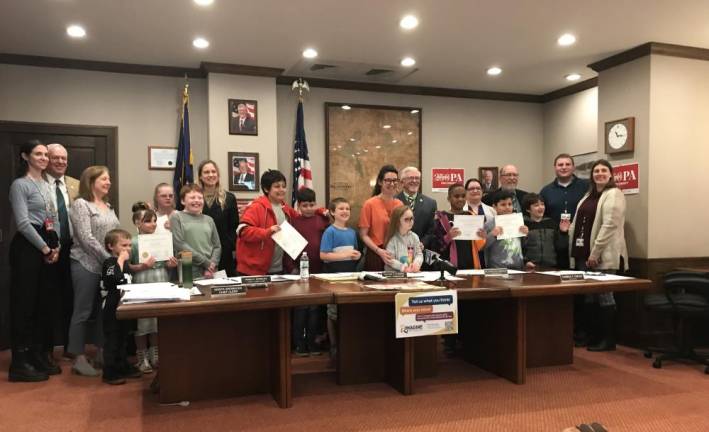Commissioners discuss mental health and disease education
Shohola. In Pike County, May is now both Tick Borne Disease and Mental Health Awareness Month.

Students from Shohola Elementary School came to the Commissioner’s meeting to hear the adoption of the resolution for Tick Borne Disease Awareness Month for May.
There are many diseases that ticks carry - including Lyme Disease, Anaplasmosis and Erhlichioisis, Babesiosis, Powassan virus disease and Rocky Mountain spotted fever. Tick Awareness month is to increase education for the public on these diseases and to minimize risk, Commissioner Tony Waldron said.
“It is extremely important because it is an educational component in our county,” Commissioner Matthew Osterberg said. “From everyone in the county, whether it’s the Aging Office 4-H or the representatives in Harrisburg, we’re all trying to come together so that we can educate the public. Education not fear.”
Brian Synder and Rosemarie “Rosie” Schoepp are members of the Tick Borne Diseases Task Force who presented an art contest, Safe Steps Art Contest, to the Delaware Valley School District. Students were encouraged to male a poster that had information about ticks and what to do when one is found. Students from Shohola Elementary School won the poster contest and were presented with certificates and a t-shirt with their design on it according to Schoepp.
The Commissioners also adopted the resolution to make May Mental Health Awareness Month in Pike County. The purpose of raising awareness for mental health is to remove stigma around it according to Commissioner Ronald Schmalzle. Mental health can affect anyone and there are many programs around the county that people can reach out to if they need help.
The National Alliance on Mental Illness (NAMI) is one of those groups. They have implemented programs with schools in four different districts to just say it out loud and talk about mental health according to Carol Kneier.
“If someone is struggling with mental illness or needs help they should go to their counselor, their teacher or to a trusted adult where they can ask for help and continue with that help,” Kneier said.